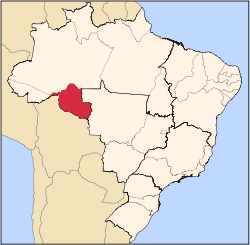Rondônia
Rondônia is a state in Brazil. It is in the northwest of the country. To the west is the state of Acre. To the north is the state of Amazonas. In the east is Mato Grosso. In the south is Bolivia. Its capital is Porto Velho. The state was named after Candido Rondon.
State of Rondônia | |
|---|---|
 Location of State of Rondônia in Brazil | |
| Coordinates: 10°54′S 62°46′W / 10.90°S 62.76°W | |
| Country | |
| Capital and Largest City | Porto Velho |
| Government | |
| • Governor | Confúcio Moura |
| • Vice Governor | Airton Gurgacz |
| Area | |
| • Total | 237,576.16 km2 (91,728.67 sq mi) |
| • Rank | 13th |
| Population (2012)[1] | |
| • Total | 1,590,011 |
| • Rank | 23rd |
| • Density | 6.7/km2 (17/sq mi) |
| • Rank | 19th |
| Demonym | Rondoniano or Rondoniense |
| GDP | |
| • Year | 2006 estimate |
| • Total | R$13,110,000,000 (22nd) |
| • Per capita | R$8,391 (15th) |
| HDI | |
| • Year | 2005 |
| • Category | 0.776 – medium (14th) |
| Time zone | UTC-4 (BRT-1) |
| Postal Code | 76800-000 to 76999-000 |
| ISO 3166 code | BR-RO |
| Website | rondonia.ro.gov.br |
Other cities include:
Geography change
The state is covered mostly by jungle of the Amazon Rainforest. About three-fifths of the state has had the jungle removed since the 1970s. Most of the people living in the state now live in urban areas. It is a big exporter of wood. The state also makes both coffee and cocoa. The breeding of cattle is also important here.
Flag change
The flag was made by Silvio Carvalho Feitosa. It was made the flag of the state on December 22, 1981. The flag uses the same colors of the flag of Brazil. The big star in the middle of the flag is a symbol for the new state. The star is shown rising into the blue sky that is stretching over Brazil (the yellow and green areas in the lower half of the flag).
Tribes change
The Akuntsu tribe is one of the tribes of Rondônia. They are one of the indigenous peoples of Brazil. They were first contacted in only 1995. At that time, there were only seven people in the tribe. As of 2006, there were six people. They live in the Igarape Omere region to the southwest of Rondônia. The tribe consists of chief Kunibu Baba (male, age: ~ 70), Pupak (male, age: ~ 40), Ururu (female, age:~80) and three women with ages from 23 to 35. The seventh member of the tribe died in 1995. The only child born after that died in 2000 in a storm. With his death the only hope of the tribe not becoming extinct lessened.[2]
Notes change
- ↑ Ibge.gov
- ↑ Akuntsu and Kanoê, Survival. Retrieved on 1st December 2006.
Other websites change
| States of Brazil | |
|---|---|
| Acre | Alagoas | Amapá | Amazonas | Bahia | Ceará | Espírito Santo | Goiás | Maranhão | Mato Grosso | Mato Grosso do Sul | Minas Gerais | Pará | Paraíba | Paraná | Pernambuco | Piauí | Rio de Janeiro | Rio Grande do Norte | Rio Grande do Sul | Rondônia | Roraima | Santa Catarina | São Paulo | Sergipe | Tocantins | |
| Federal district: Distrito Federal | |

